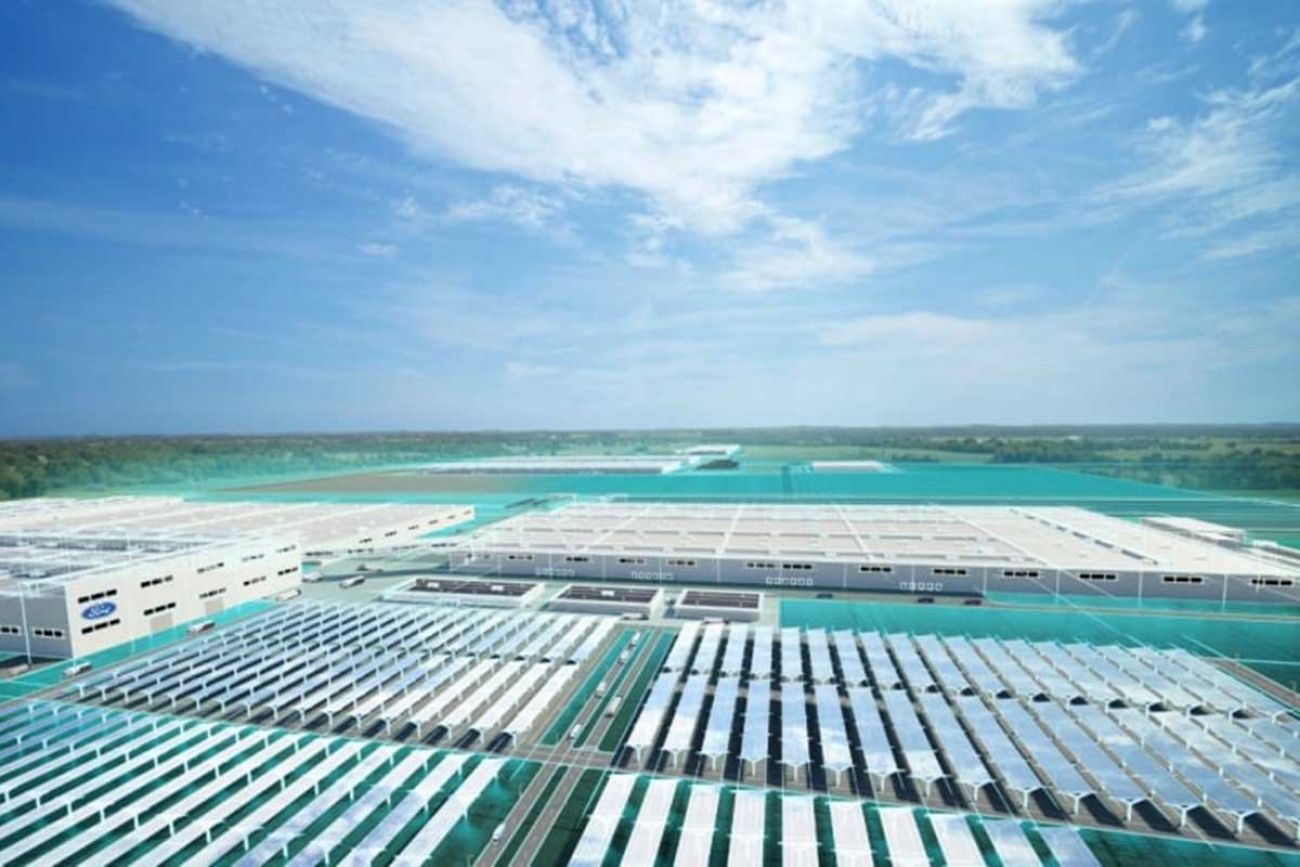Michigan wants to lead U.S. in electric vehicles. Ford turned elsewhere.

September seemed like a big month for electric vehicle announcements in Michigan, with Gov. Gretchen Whitmer celebrating everything from 100 new jobs at a Plymouth battery manufacturer to her vision for creating a charging network around Lake Michigan.
But the public narrative over the scope of Michigan’s auto electrification gains changed dramatically on Tuesday, when Ford Motor Co. announced plans for two new manufacturing campuses worth $11.4 billion, its largest manufacturing investment ever.
Neither project will be in Michigan, raising questions about how smartly the state is positioned to remain competitive to auto manufacturers as it adapts its century-long automotive strengths to the industry’s pivot from gasoline-powered engines to electrification.
Related:
- Whitmer: Michigan can take lead in electric vehicle highway, job training
- Flat Rock residents can go home, as search for cause of gas leak continues
- Frustration and fears linger as Flat Rock confronts Ford factory’s gas leak
- After two weeks and 1,100 evacuations, mishap tests Flat Rock’s loyalty to Ford
Combined, the two new Ford battery and assembly sites are major steps to what the automaker calls its “long-term vision to lead America’s transition to electric vehicles.”
Despite the plans taking shape in other states, economist John Austin argues that the projects also benefit Michigan, citing Ford’s ongoing state investments in other aspects of EV production, including high-value engineering.
But the announcement also raises questions about the effectiveness of Michigan’s stated goal of leading the global transition to automotive electrification, or EVs.
“The automotive industry is Michigan’s game to lose, and we’ve lost the first inning,” said Randy Thelen, CEO of The Right Place, an economic development organization based in Grand Rapids, in a statement about Ford’s massive investment in battery production in two other states.
The Dearborn-based automaker chose Tennessee for what it called “the largest, most advanced and most efficient auto production campus in Ford’s history.” Blue Oval City will sit on 3,600 acres northeast of Memphis and employ 6,000 people.
And Ford turned to Kentucky for its twin battery factories to be built with partner SK Innovation, a battery cell supplier, on 1,500 acres southwest of Louisville.
With the pair of new facility announcements, Ford’s combined investment in EV batteries eclipsed total investment made by all automakers in electric and autonomous vehicles in Michigan over an entire decade. MichAUTO, the auto-focused arm of the Detroit Regional Chamber of Commerce, said $10.6 billion has been invested in Michigan from 2010 to 2020, nearly a billion dollars less than the two new factories are worth.
Questioned about the Tennessee and Kentucky deals, Whitmer said Wednesday that Ford did not seriously negotiate with Michigan for the factories, which the head of the Michigan Economic Development Corporation also said earlier in the week.
The state had rolled out incentives worth millions for other Ford projects in the state, including helping the automaker this week save an estimated $6 million from its $265 million investment in the Dearborn Truck Plant as it considers expanding electric F-150 Lightning production there.
“I'm always looking to make Michigan more competitive, and always eager to put solutions on the table,” Whitmer told reporters after she signed the state’s $70 billion budget for the next fiscal year. “But we needed a real opportunity to do that. And that really wasn't the case here.”
But Ford said Michigan did not have what it needed for the massive projects, which company officials said would generate 11,000 direct jobs and indirectly lead to thousands of other employment opportunities in the regions where the plants will be built. Among the selection factors where Michigan can not currently compete, CEO Jim Farley said, are low utility costs and adequately sized plant sites.
“Location decisions for our new mega campus were based on several factors — starting with site size, shovel-readiness, and proximity to other EV sites, transportation and other key services,” Ford spokesperson Martin Gunsberg told Bridge Michigan.
Gunsberg continued: “Michigan did not have the type of sites needed for this project, so they were not part of the formal bid process.”
A week before Ford’s announcement, state and business leaders at the annual Mackinac Policy Conference were talking up Michigan’s potential “to be at the epicenter of the next decade of automotive production and innovation,” due in part to the state having one-third of all battery production and development, according to a report from MichAUTO.
“I am laser focused on growing our economy, creating good-paying jobs and building the future of mobility and electrification right here in Michigan,” said Whitmer at a press conference at the political gathering, where she appeared with Quentin Messer, the new CEO of the MEDC, and Matthew Godlewski, Ford’s vice president of government relations.
Godlewski cited $7.7 billion of investment Ford has made in the state since 2016, including at the Mobility Innovation District under construction at the Michigan Central Train Station in Detroit.
“As you look at these investments around southeast Michigan, you can see that we’re creating a hub of advanced vehicle research, engineering, design, testing and manufacturing,” Godlewski said.
Ford said it expects 40 percent to 50 percent of its worldwide sales to be fully electric by 2030.
Godlewski did not mention at the time the new factories slated for Tennessee and Kentucky.
Thelen, the economic development strategist, called the Ford decision a “setback for Michigan.” He said the company’s investment in southern states recalled the closure in the early 1990s of the General Motors Corp Willow Run Assembly plant in Ypsilanti Township, when GM chose to consolidate production in Arlington, Texas.
“That decision was a wake-up call to our state, which led to the development of an aggressive and robust set of economic development programs and strategies, which unfortunately have faded over the last decade,” Thelen said.
Among those efforts was the Good Jobs for Michigan tax incentive program, which expired in 2019, despite the recent urging of the Detroit Regional Chamber and other business groups for the Legislature to reinstate it. It had started during the administration of Republican Gov. Rick Snyder, who initially was against tax incentives before he signed the legislation in 2017, saying the state needed a recruitment tool for large companies.
Thelen said Wednesday that “how we respond today will set the course for the next generation of Michigan’s economic future.”
To keep or expand the automotive industry’s investment in Michigan, Thelen said the state needs to take some aggressive steps, including:
- Shovel-ready sites for companies to build EV-related facilities and other large-scale, job-generating projects.
- Economic incentive tools that mirror those in other states.
- Competitive utility rates for large-scale projects.
- Workforce training for high-tech jobs emerging from the EV transition.
Whitmer addressed part of the workforce training at the Mackinac Island press conference, announcing up to $5 million will be spent to create an EV training center to help retrain the estimated 46,000 current auto workers who no longer will be making combustion engines in coming years.
Other changes could take place as the Legislature takes up Whitmer’s economic proposals, called the MI New Economy Plan, in which she seeks to expand the state’s skilled labor force and support high-tech job growth, including in mobility and vehicle electrification.
“There is no doubt that the landscape remains competitive for automotive and EV manufacturing projects — and Michigan is up to the challenge,” Otie McKinley, spokesperson for the MEDC, told Bridge.
Initiatives like the state speeding up EV charging infrastructure buildout will be a part of that, McKinley said, as MEDC works with groups that include the state’s utility companies to “compete on a global level and boost our speed to market.”
Other signs of EV growth are happening in the state, state officials said Wednesday:
- GM located its first fully dedicated electric vehicle assembly plant in Hamtramck, planning on 2,200 jobs.
- Stellantis is building JEEP plug-in hybrid models at its new factory in Detroit, hiring more than 6,400 people.
- XL Fleet opened its new Fleet Electrification Technology Center in Wixom for commercial EV retrofitting, and Canadian auto supplier Magna International is building a factory in St. Clair to supply battery enclosures for GM’s new GMC Hummer EV.
Meanwhile, economist Austin, former Democratic head of the State School Board and director of the Michigan Economic Center, disagreed with Thelen’s assertion that Ford’s out-of-state battery development is bad for Michigan.
On a global basis, the move to set up 11,000 employees over two U.S.-based campuses signals Ford’s bet on growth by seizing EV opportunities. If successful, the company will remain an employment leader in Michigan.
“It’s a really great thing for Michigan’s economy to have these plants and investments made, even in Kentucky and Tennessee,” Austin said. “What it means is that Ford and the whole industry is growing production … and they’re pulling some of the production that was far-flung across the world back into North America.”
The factories will source components from “all over,” Austin said, including Michigan. And EV development will take place here, including in Corktown.
“As long as the ‘brains’ of the operation for Ford stay up here, meaning the headquarters, the engineering, the design, the marketing … that means we’re doing the high-value stuff,” Austin said.
“It’s growing a footprint of economic activity at the highest end here.”
Business Watch
Covering the intersection of business and policy, and informing Michigan employers and workers on the long road back from coronavirus.
- About Business Watch
- Subscribe
- Share tips and questions with Bridge Business Editor Paula Gardner
Thanks to our Business Watch sponsors.
Support Bridge's nonprofit civic journalism. Donate today.
See what new members are saying about why they donated to Bridge Michigan:
- “In order for this information to be accurate and unbiased it must be underwritten by its readers, not by special interests.” - Larry S.
- “Not many other media sources report on the topics Bridge does.” - Susan B.
- “Your journalism is outstanding and rare these days.” - Mark S.
If you want to ensure the future of nonpartisan, nonprofit Michigan journalism, please become a member today. You, too, will be asked why you donated and maybe we'll feature your quote next time!




